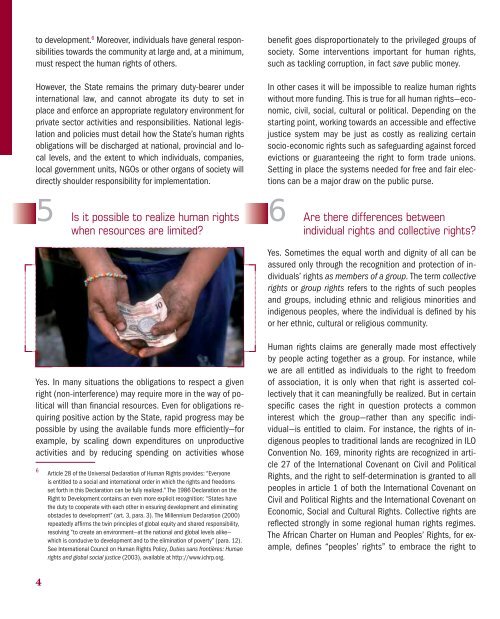Frequently Asked Questions on Human Rights-Based Approach
Frequently Asked Questions on Human Rights-Based Approach
Frequently Asked Questions on Human Rights-Based Approach
- No tags were found...
Create successful ePaper yourself
Turn your PDF publications into a flip-book with our unique Google optimized e-Paper software.
to development. 6 Moreover, individuals have general resp<strong>on</strong>sibilitiestowards the community at large and, at a minimum,must respect the human rights of others.However, the State remains the primary duty-bearer underinternati<strong>on</strong>al law, and cannot abrogate its duty to set inplace and enforce an appropriate regulatory envir<strong>on</strong>ment forprivate sector activities and resp<strong>on</strong>sibilities. Nati<strong>on</strong>al legislati<strong>on</strong>and policies must detail how the State’s human rightsobligati<strong>on</strong>s will be discharged at nati<strong>on</strong>al, provincial and locallevels, and the extent to which individuals, companies,local government units, NGOs or other organs of society willdirectly shoulder resp<strong>on</strong>sibility for implementati<strong>on</strong>.benefit goes disproporti<strong>on</strong>ately to the privileged groups ofsociety. Some interventi<strong>on</strong>s important for human rights,such as tackling corrupti<strong>on</strong>, in fact save public m<strong>on</strong>ey.In other cases it will be impossible to realize human rightswithout more funding. This is true for all human rights—ec<strong>on</strong>omic,civil, social, cultural or political. Depending <strong>on</strong> thestarting point, working towards an accessible and effectivejustice system may be just as costly as realizing certainsocio-ec<strong>on</strong>omic rights such as safeguarding against forcedevicti<strong>on</strong>s or guaranteeing the right to form trade uni<strong>on</strong>s.Setting in place the systems needed for free and fair electi<strong>on</strong>scan be a major draw <strong>on</strong> the public purse.5 Is it possible to realize human rightswhen resources are limited?6 Are there differences betweenindividual rights and collective rights?Yes. Sometimes the equal worth and dignity of all can beassured <strong>on</strong>ly through the recogniti<strong>on</strong> and protecti<strong>on</strong> of individuals’rights as members of a group. The term collectiverights or group rights refers to the rights of such peoplesand groups, including ethnic and religious minorities andindigenous peoples, where the individual is defined by hisor her ethnic, cultural or religious community.Yes. In many situati<strong>on</strong>s the obligati<strong>on</strong>s to respect a givenright (n<strong>on</strong>-interference) may require more in the way of politicalwill than financial resources. Even for obligati<strong>on</strong>s requiringpositive acti<strong>on</strong> by the State, rapid progress may bepossible by using the available funds more efficiently—forexample, by scaling down expenditures <strong>on</strong> unproductiveactivities and by reducing spending <strong>on</strong> activities whose6Article 28 of the Universal Declarati<strong>on</strong> of <strong>Human</strong> <strong>Rights</strong> provides: “Every<strong>on</strong>eis entitled to a social and internati<strong>on</strong>al order in which the rights and freedomsset forth in this Declarati<strong>on</strong> can be fully realized.” The 1986 Declarati<strong>on</strong> <strong>on</strong> theRight to Development c<strong>on</strong>tains an even more explicit recogniti<strong>on</strong>: “States havethe duty to cooperate with each other in ensuring development and eliminatingobstacles to development” (art. 3, para. 3). The Millennium Declarati<strong>on</strong> (2000)repeatedly affirms the twin principles of global equity and shared resp<strong>on</strong>sibility,resolving “to create an envir<strong>on</strong>ment—at the nati<strong>on</strong>al and global levels alike—which is c<strong>on</strong>ducive to development and to the eliminati<strong>on</strong> of poverty” (para. 12).See Internati<strong>on</strong>al Council <strong>on</strong> <strong>Human</strong> <strong>Rights</strong> Policy, Duties sans fr<strong>on</strong>tières: <strong>Human</strong>rights and global social justice (2003), available at http://www.ichrp.org.<strong>Human</strong> rights claims are generally made most effectivelyby people acting together as a group. For instance, whilewe are all entitled as individuals to the right to freedomof associati<strong>on</strong>, it is <strong>on</strong>ly when that right is asserted collectivelythat it can meaningfully be realized. But in certainspecific cases the right in questi<strong>on</strong> protects a comm<strong>on</strong>interest which the group—rather than any specific individual—isentitled to claim. For instance, the rights of indigenouspeoples to traditi<strong>on</strong>al lands are recognized in ILOC<strong>on</strong>venti<strong>on</strong> No. 169, minority rights are recognized in article27 of the Internati<strong>on</strong>al Covenant <strong>on</strong> Civil and Political<strong>Rights</strong>, and the right to self-determinati<strong>on</strong> is granted to allpeoples in article 1 of both the Internati<strong>on</strong>al Covenant <strong>on</strong>Civil and Political <strong>Rights</strong> and the Internati<strong>on</strong>al Covenant <strong>on</strong>Ec<strong>on</strong>omic, Social and Cultural <strong>Rights</strong>. Collective rights arereflected str<strong>on</strong>gly in some regi<strong>on</strong>al human rights regimes.The African Charter <strong>on</strong> <strong>Human</strong> and Peoples’ <strong>Rights</strong>, for example,defines “peoples’ rights” to embrace the right to4
















